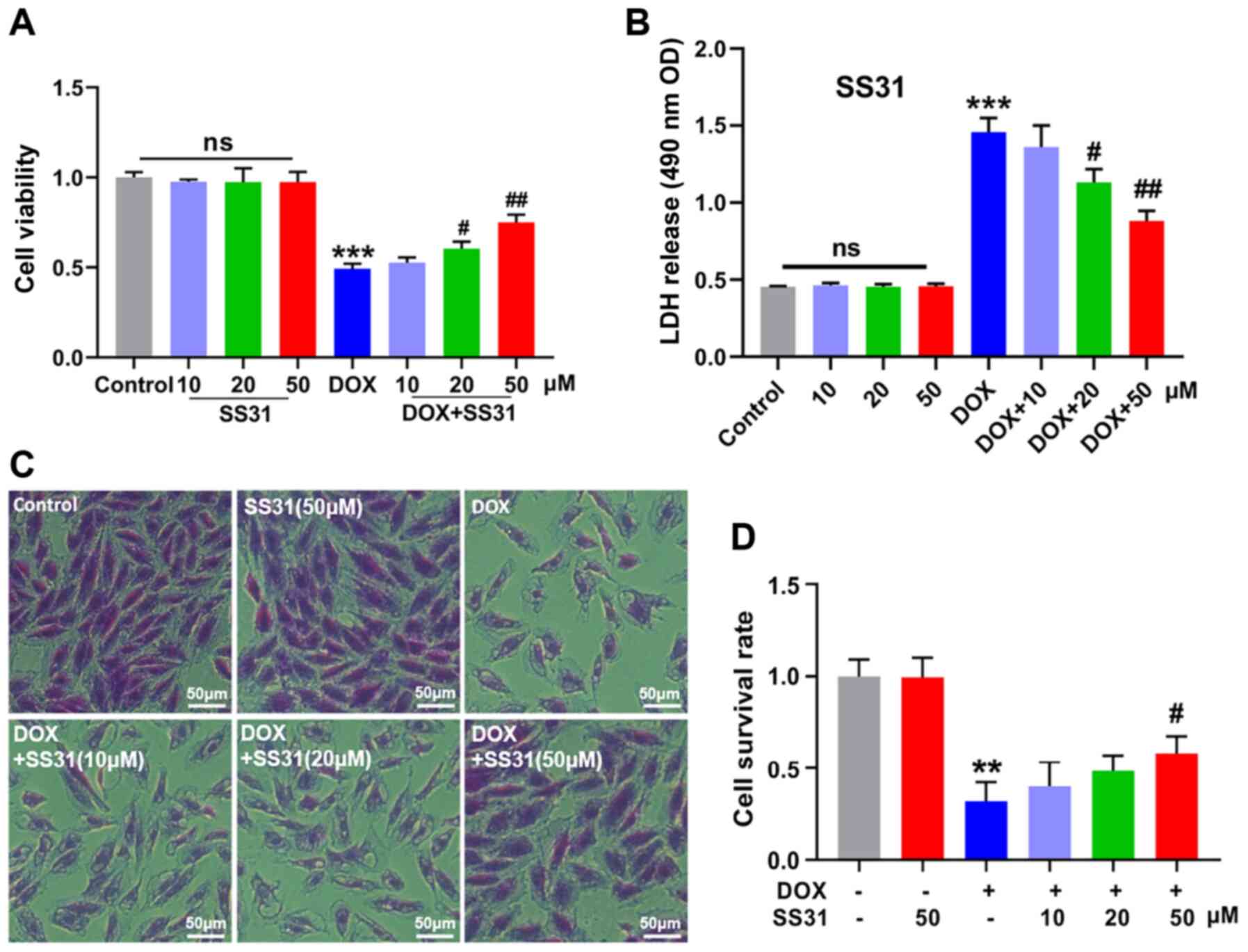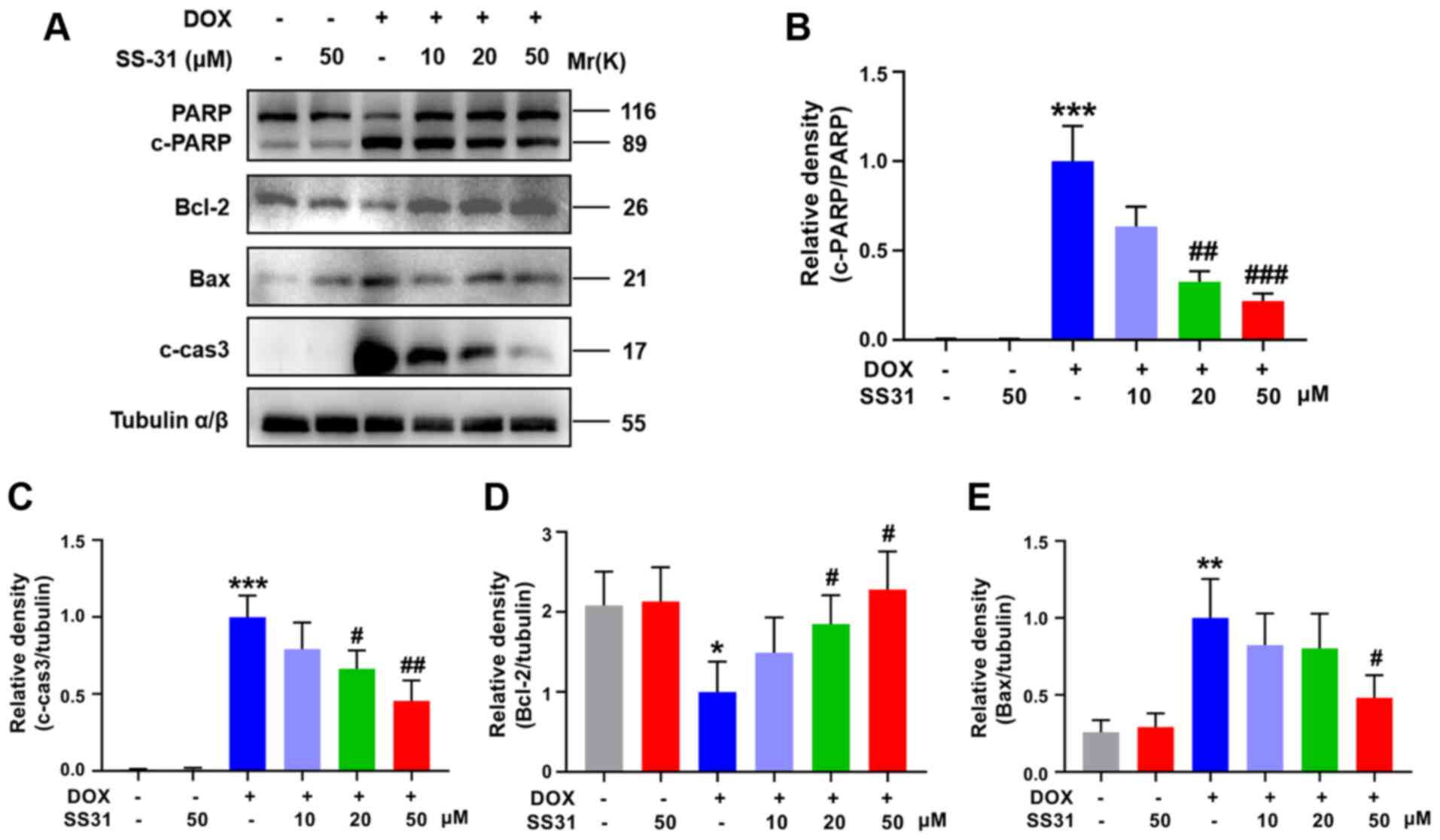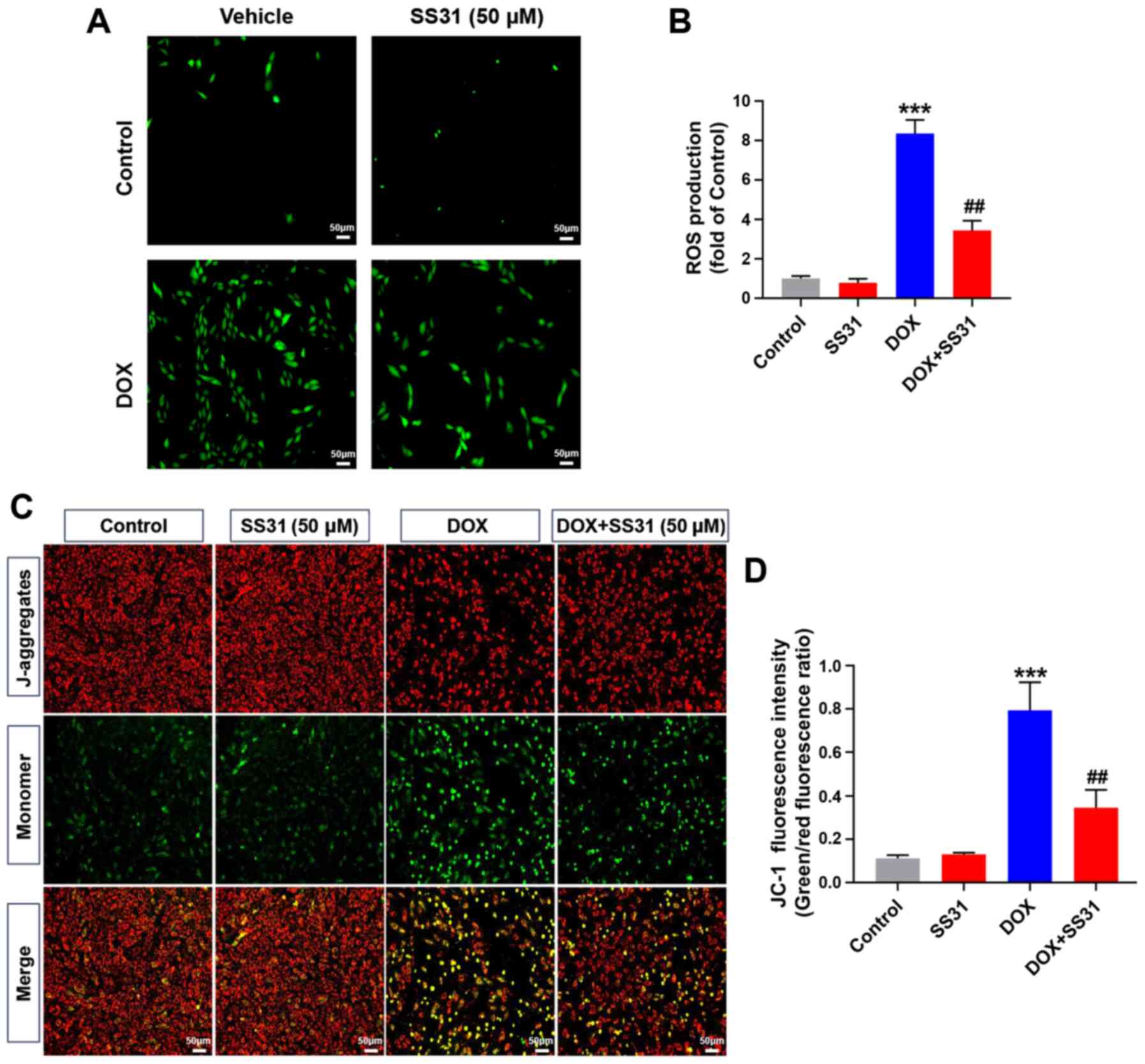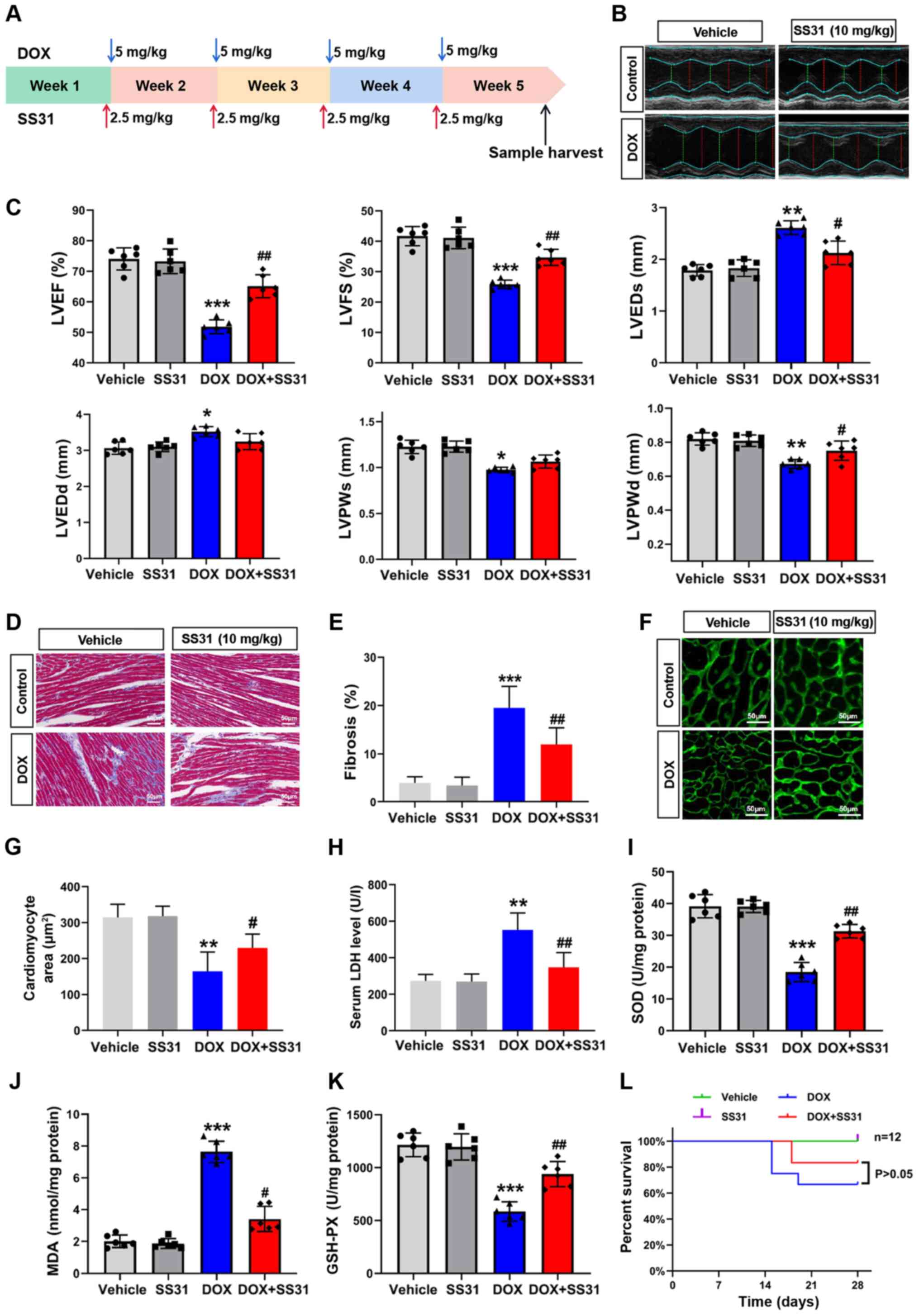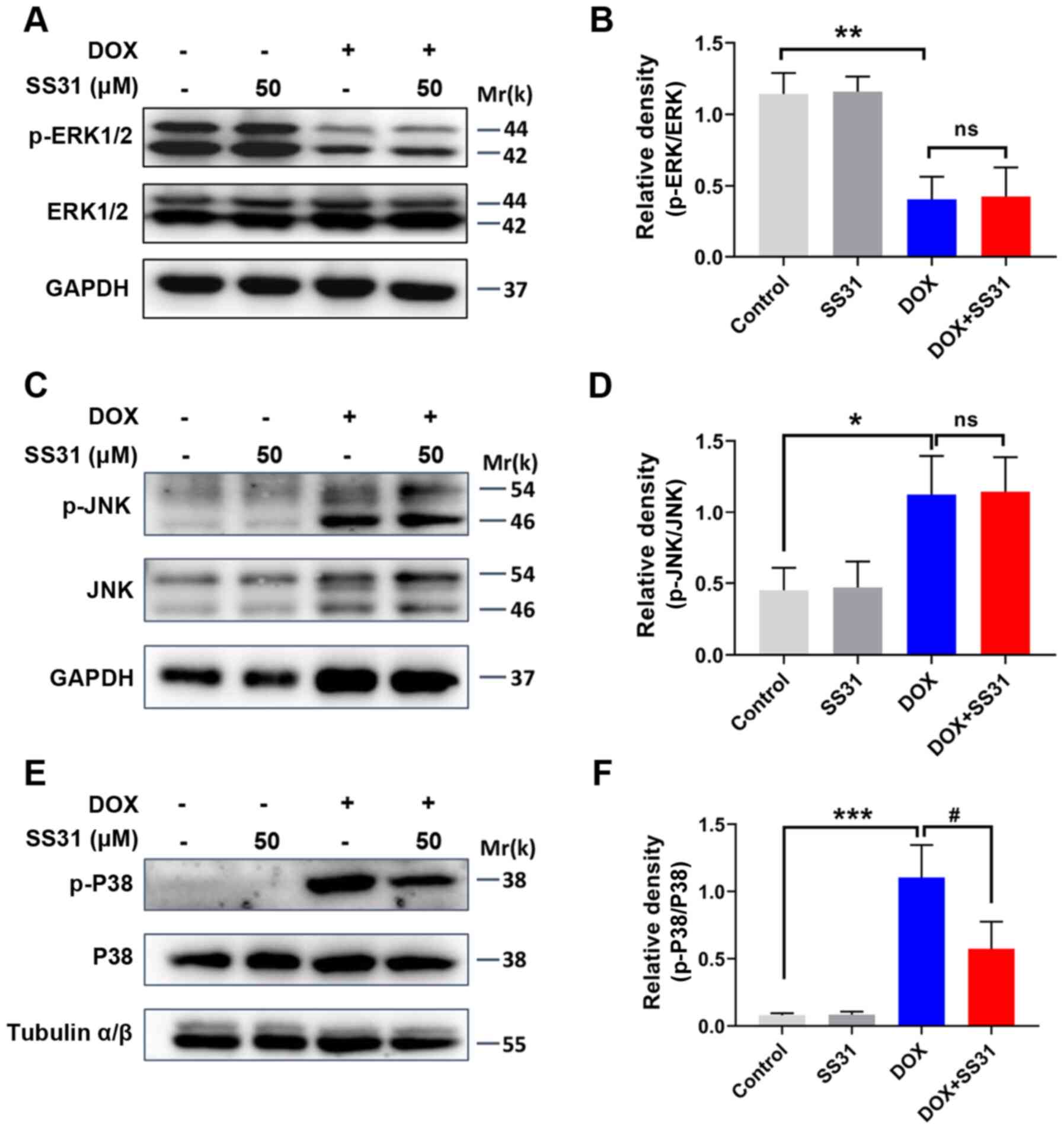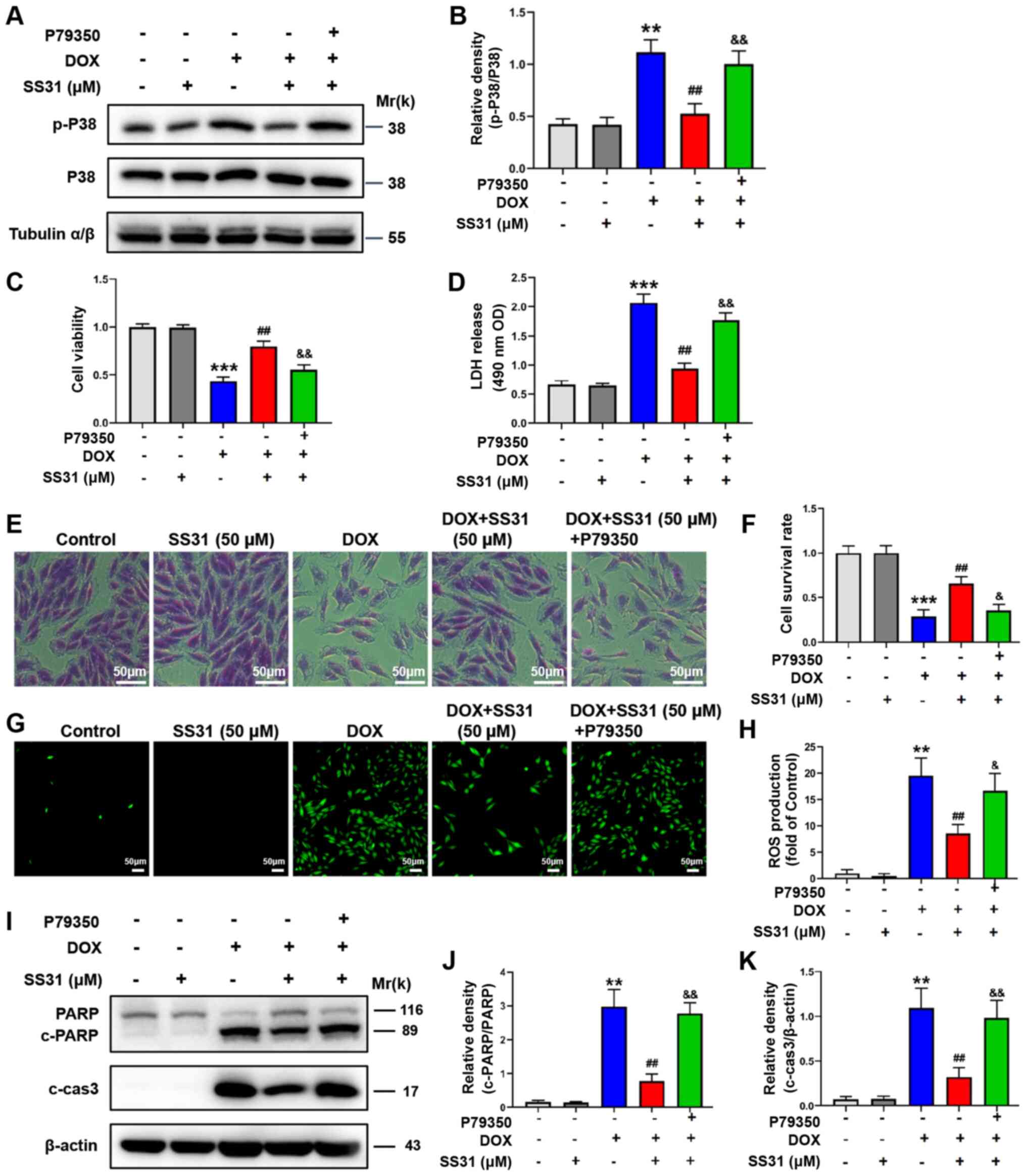|
1
|
Martins-Teixeira MB and Carvalho I:
Antitumour anthracyclines: Progress and perspectives. ChemMedChem.
15:933–948. 2020. View Article : Google Scholar : PubMed/NCBI
|
|
2
|
Ji X, Ding W, Xu T, Zheng X, Zhang J, Liu
M, Liu G and Wang J: MicroRNA-31-5p attenuates doxorubicin-induced
cardiotoxicity via quaking and circular RNA Pan3. J Mol Cell
Cardiol. 140:56–67. 2020. View Article : Google Scholar : PubMed/NCBI
|
|
3
|
Kalyanaraman B: Teaching the basics of the
mechanism of doxorubicin-induced cardiotoxicity: Have we been
barking up the wrong tree? Redox Biol. 29:1013942020. View Article : Google Scholar
|
|
4
|
Li DL and Hill JA: Cardiomyocyte autophagy
and cancer chemotherapy. J Mol Cell Cardiol. 71:54–61. 2014.
View Article : Google Scholar
|
|
5
|
Osataphan N, Phrommintikul A, Chattipakorn
SC and Chattipakorn N: Effects of doxorubicin-induced
cardiotoxicity on cardiac mitochondrial dynamics and mitochondrial
function: Insights for future interventions. J Cell Mol Med.
24:6534–6557. 2020. View Article : Google Scholar : PubMed/NCBI
|
|
6
|
Octavia Y, Tocchetti CG, Gabrielson KL,
Janssens S, Crijns HJ and Moens AL: Doxorubicin-induced
cardiomyopathy: From molecular mechanisms to therapeutic
strategies. J Mol Cell Cardiol. 52:1213–1225. 2012. View Article : Google Scholar : PubMed/NCBI
|
|
7
|
Wang AJ, Zhang J, Xiao M, Wang S, Wang BJ,
Guo Y, Tang Y and Gu J: Molecular mechanisms of doxorubicin-induced
cardiotoxicity: Novel roles of sirtuin 1-mediated signaling
pathways. Cell Mol Life Sci. Jan 13–2021.Epub ahead of print.
View Article : Google Scholar : PubMed/NCBI
|
|
8
|
Tahover E, Segal A, Isacson R, Rosengarten
O, Grenader T, Gips M, Cherny N, Heching NI, Mesika L, Catane R and
Gabizon A: Dexrazoxane added to doxorubicin-based adjuvant
chemotherapy of breast cancer: A retrospective cohort study with a
comparative analysis of toxicity and survival. Anticancer Drugs.
28:787–794. 2017. View Article : Google Scholar : PubMed/NCBI
|
|
9
|
Ajith TA and Jayakumar TG:
Mitochondria-targeted agents: Future perspectives of mitochondrial
pharmaceutics in cardiovascular diseases. World J Cardiol.
6:1091–1099. 2014. View Article : Google Scholar : PubMed/NCBI
|
|
10
|
Lee FY, Shao PL, Wallace CG, Chua S, Sung
PH, Ko SF, Chai HT, Chung SY, Chen KH, Lu HI, et al: Combined
therapy with SS31 and mitochondria mitigates myocardial
ischemia-reperfusion injury in rats. Int J Mol Sci. 19:27822018.
View Article : Google Scholar :
|
|
11
|
Dai DF, Hsieh EJ, Chen T, Menendez LG,
Basisty NB, Tsai L, Beyer RP, Crispin DA, Shulman NJ, Szeto HH, et
al: Global proteomics and pathway analysis of
pressure-overload-induced heart failure and its attenuation by
mitochondrial-targeted peptides. Circ Heart Fail. 6:1067–1076.
2013. View Article : Google Scholar : PubMed/NCBI
|
|
12
|
Liu Y, Yang W, Sun X, Xie L, Yang Y, Sang
M and Jiao R: SS31 ameliorates sepsis-induced heart injury by
inhibiting oxidative stress and inflammation. Inflammation.
42:2170–2180. 2019. View Article : Google Scholar : PubMed/NCBI
|
|
13
|
Dai DF, Chen T, Szeto H, Nieves-Cintron M,
Kutyavin V, Santana LF and Rabinovitch PS: Mitochondrial targeted
antioxidant Peptide ameliorates hypertensive cardiomyopathy. J Am
Coll Cardiol. 58:73–82. 2011. View Article : Google Scholar : PubMed/NCBI
|
|
14
|
Yue J and Lopez JM: Understanding MAPK
signaling pathways in apoptosis. Int J Mol Sci. 21:23462020.
View Article : Google Scholar :
|
|
15
|
Yue TL, Wang C, Gu JL, Ma XL, Kumar S, Lee
JC, Feuerstein GZ, Thomas H, Maleeff B and Ohlstein EH: Inhibition
of extracellular signal-regulated kinase enhances
ischemia/reoxygenation-induced apoptosis in cultured cardiac
myocytes and exaggerates reperfusion injury in isolated perfused
heart. Circ Res. 86:692–699. 2000. View Article : Google Scholar : PubMed/NCBI
|
|
16
|
Wang N, Guan P, Zhang JP, Li YQ, Chang YZ,
Shi ZH, Wang FY and Chu L: Fasudil hydrochloride hydrate, a
Rho-kinase inhibitor, suppresses isoproterenol-induced heart
failure in rats via JNK and ERK1/2 pathways. J Cell Biochem.
112:1920–1929. 2011. View Article : Google Scholar : PubMed/NCBI
|
|
17
|
Liu D, Ma Z, Di S, Yang Y, Yang J, Xu L,
Reiter RJ, Qiao S and Yuan J: AMPK/PGC1a activation by melatonin
attenuates acute doxorubicin cardiotoxicity via alleviating
mitochondrial oxidative damage and apoptosis. Free Radic Biol Med.
129:59–72. 2018. View Article : Google Scholar : PubMed/NCBI
|
|
18
|
Krais JJ and Johnson N: Ectopic RNF168
expression promotes break-induced replication-like DNA synthesis at
stalled replication forks. Nucleic Acids Res. 48:4298–4308. 2020.
View Article : Google Scholar : PubMed/NCBI
|
|
19
|
Fan J, Shen W, Lee SR, Mathai AE, Zhang R,
Xu G and Gillies MC: Targeting the Notch and TGF-ß signaling
pathways to prevent retinal fibrosis in vitro and in vivo.
Theranostics. 10:7956–7973. 2020. View Article : Google Scholar :
|
|
20
|
National Research Council (US): Committee
for the Update of the Guide for the Care and Use of Laboratory
Animals: Guide for the Care and Use of Laboratory Animals. 8th
edition. National Academies Press; Washington, DC: 2011
|
|
21
|
Oh J, Lee BS, Lim G, Lim H, Lee CJ, Park
S, Lee SH, Chung JH and Kang SM: Atorvastatin protects
cardiomyocyte from doxorubicin toxicity by modulating survivin
expression through FOXO1 inhibition. J Mol Cell Cardiol.
138:244–255. 2020. View Article : Google Scholar
|
|
22
|
Zhang L, Wang X, Feng M, Zhang H, Xu J,
Ding J, Cheng Z and Qian L: Peptidomics analysis reveals peptide
PDCryab1 inhibits doxorubicin-induced cardiotoxicity. Oxid Med Cell
Longev. 2020:71824282020. View Article : Google Scholar : PubMed/NCBI
|
|
23
|
Liang L, Tu Y, Lu J, Wang P, Guo Z, Wang
Q, Guo K, Lan R, Li H and Liu P: Dkk1 exacerbates
doxorubicin-induced cardiotoxicity by inhibiting the Wnt/ß-catenin
signaling pathway. J Cell Sci. 132:cs2284782019. View Article : Google Scholar
|
|
24
|
Rochette L, Guenancia C, Gudjoncik A,
Hachet O, Zeller M, Cottin Y and Vergely C:
Anthracyclines/trastuzumab: New aspects of cardiotoxicity and
molecular mechanisms. Trends Pharmacol Sci. 36:326–348. 2015.
View Article : Google Scholar : PubMed/NCBI
|
|
25
|
Hantson P: Mechanisms of toxic
cardiomyopathy. Clin Toxicol (Phila). 57:1–9. 2019. View Article : Google Scholar
|
|
26
|
Zhao L, Qi Y, Xu L, Tao X, Han X, Yin L
and Peng J: MicroRNA-140-5p aggravates doxorubicin-induced
cardiotoxicity by promoting myocardial oxidative stress via
targeting Nrf2 and Sirt2. Redox Biol. 15:284–296. 2018. View Article : Google Scholar : PubMed/NCBI
|
|
27
|
Zhang P, Chen Z, Lu D, Wu Y, Fan M, Qian J
and Ge J: Overexpression of COX5A protects H9c2 cells against
doxorubicin-induced cardiotoxicity. Biochem Biophys Res Commun.
524:43–49. 2020. View Article : Google Scholar : PubMed/NCBI
|
|
28
|
Kim HS, Lee YS and Kim DK: Doxorubicin
exerts cytotoxic effects through cell cycle arrest and Fas-mediated
cell death. Pharmacology. 84:300–309. 2009. View Article : Google Scholar : PubMed/NCBI
|
|
29
|
Yu J, Gao H, Wu C, Xu QM, Lu JJ and Chen
X: Diethyl blechnic, a novel natural product isolated from salvia
miltiorrhiza bunge, inhibits doxorubicin-induced apoptosis by
inhibiting ROS and activating JNK1/2. Int J Mol Sci. 19:18092018.
View Article : Google Scholar :
|
|
30
|
Varela-Lopez A, Battino M, Navarro-Hortal
MD, Giampieri F, Forbes-Hernandez TY, Romero-Marquez JM, Collado R
and Quiles JL: An update on the mechanisms related to cell death
and toxicity of doxorubicin and the protective role of nutrients.
Food Chem Toxicol. 134:1108342019. View Article : Google Scholar : PubMed/NCBI
|
|
31
|
Gorini S, De Angelis A, Berrino L, Malara
N, Rosano G and Ferraro E: Chemotherapeutic drugs and mitochondrial
dysfunction: Focus on doxorubicin, trastuzumab, and sunitinib. Oxid
Med Cell Longev. 2018:75827302018. View Article : Google Scholar : PubMed/NCBI
|
|
32
|
Orrenius S, Gogvadze V and Zhivotovsky B:
Mitochondrial oxidative stress: Implications for cell death. Annu
Rev Pharmacol Toxicol. 47:143–183. 2007. View Article : Google Scholar
|
|
33
|
Wallace KB, Sardao VA and Oliveira PJ:
Mitochondrial determinants of doxorubicin-induced cardiomyopathy.
Circ Res. 126:926–941. 2020. View Article : Google Scholar : PubMed/NCBI
|
|
34
|
Mitchell W, Ng EA, Tamucci JD, Boyd KJ,
Sathappa M, Coscia A, Pan M, Han X, Eddy NA, May ER, et al: The
mitochondria-targeted peptide SS-31 binds lipid bilayers and
modulates surface electrostatics as a key component of its
mechanism of action. J Biol Chem. 295:7452–7469. 2020. View Article : Google Scholar : PubMed/NCBI
|
|
35
|
Hou Y, Shi Y, Han B, Liu X, Qiao X, Qi Y
and Wang L: The antioxidant peptide SS31 prevents oxidative stress,
downregu- lates CD36 and improves renal function in diabetic
nephropathy. Nephrol Dial Transplant. 33:1908–1918. 2018.
View Article : Google Scholar : PubMed/NCBI
|
|
36
|
Reddy PH, Manczak M, Yin X and Reddy AP:
Synergistic protective effects of mitochondrial division inhibitor
1 and mito- chondria-targeted small peptide SS31 in Alzheimer's
disease. J Alzheimers Dis. 62:1549–1565. 2018. View Article : Google Scholar
|
|
37
|
Zhou J, Li Z, Chen Z and Yang K:
Protective effect of mitochondria-targeted antioxidant SS31 on
early brain injury following subarachnoid hemorrhage in rats. Zhong
Nan Da Xue Xue Bao Yi Xue Ban. 42:1003–1009. 2017.In Chinese.
PubMed/NCBI
|
|
38
|
Yin X, Manczak M and Reddy PH:
Mitochondria-targeted molecules MitoQ and SS31 reduce mutant
huntingtin-induced mitochondrial toxicity and synaptic damage in
Huntington's disease. Hum Mol Genet. 25:1739–1753. 2016. View Article : Google Scholar : PubMed/NCBI
|
|
39
|
Ma H, Chen S, Xiong H, Wang M, Hang W, Zhu
X, Zheng Y, Ge B, Li R and Cui H: Astaxanthin from Haematococcus
pluvialis ameliorates the chemotherapeutic drug (doxorubicin)
induced liver injury through the Keap1/Nrf2/HO-1 pathway in mice.
Food Funct. 11:4659–4671. 2020. View Article : Google Scholar : PubMed/NCBI
|
|
40
|
Vu M, Kassouf N, Ofili R, Lund T, Bell C
and Appiah S: Doxorubicin selectively induces apoptosis through the
inhibition of a novel isoform of Bcl2 in acute myeloid leukaemia
MOLM13 cells with reduced Beclin 1 expression. Int J Oncol.
57:113–121. 2020. View Article : Google Scholar : PubMed/NCBI
|
|
41
|
Faridvand Y, Haddadi P, Vahedian V, Nozari
S, Nejabati HR, Pezeshkian M, Afrasiabi A, Safaie N, Jodati A and
Nouri M: Human amnion membrane proteins prevent doxorubicin-
induced oxidative stress injury and apoptosis in rat H9c2
cardiomyocytes. Cardiovasc Toxicol. 20:370–379. 2020. View Article : Google Scholar : PubMed/NCBI
|
|
42
|
Wu YZ, Zhang L, Wu ZX, Shan TT and Xiong
C: Berberine ameliorates doxorubicin-induced cardiotoxicity via a
SIRT1/p66Shc-mediated pathway. Oxid Med Cell Longev.
2019:21503942019. View Article : Google Scholar : PubMed/NCBI
|
|
43
|
Cuadrado A and Nebreda AR: Mechanisms and
functions of p38 MAPK signalling. Biochem J. 429:403–417. 2010.
View Article : Google Scholar : PubMed/NCBI
|
|
44
|
Kulisz A, Chen N, Chandel NS, Shao Z and
Schumacker PT: Mitochondrial ROS initiate phosphorylation of p38
MAP kinase during hypoxia in cardiomyocytes. Am J Physiol Lung Cell
Mol Physiol. 282:L1324–L1329. 2002. View Article : Google Scholar : PubMed/NCBI
|
|
45
|
Cao M, Jiang J, Du Y and Yan P:
Mitochondria-targeted antioxidant attenuates high glucose-induced
P38 MAPK pathway activation in human neuroblastoma cells. Mol Med
Rep. 5:929–934. 2012. View Article : Google Scholar : PubMed/NCBI
|
|
46
|
Guo Z, Tang N, Liu FY, Yang Z, Ma SQ, An
P, Wu HM, Fan D and Tang QZ: TLR9 deficiency alleviates
doxorubicin- induced cardiotoxicity via the regulation of
autophagy. J Cell Mol Med. 24:10913–10923. 2020. View Article : Google Scholar : PubMed/NCBI
|















